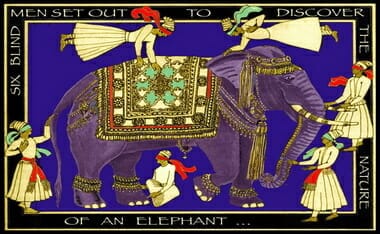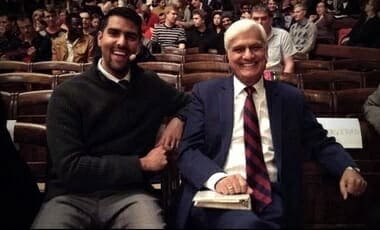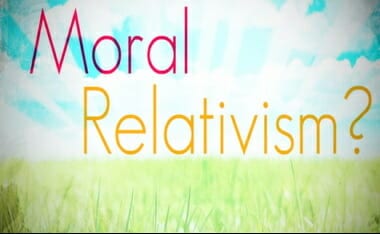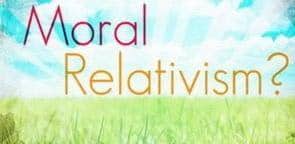This video was pretty jaw-dropping. But thinking through it I started to note that this “GNOSTIC THINKING” is an aspect of our rebellious, fallen nature.
Thus, it shouldn’t make our jaw drop, as believers we should be saddened for her but thankful that God saved us from the same thinking via our depraved minds.
Our default before Christ. Thus, this shouldn’t surprise us… let me explain.
What IS this “THINKING”?
I believe it to be a lie from the Garden of Eden when the serpent said this:
(Genesis 3) 1 Now the serpent was shrewder than any of the wild animals that the Lord God had made. He said to the woman, “Is it really true that God said, ‘You must not eat from any tree of the orchard’?” 2 The woman said to the serpent, “We may eat of the fruit from the trees of the orchard; 3 but concerning the fruit of the tree that is in the middle of the orchard God said, ‘You must not eat from it, and you must not touch it, or else you will die.’” 4 The serpent said to the woman, “Surely you will not die, 5 for God knows that when you eat from it your eyes will open and you will be like God, knowing good and evil.”
6 When the woman saw that the tree produced fruit that was good for food, was attractive to the eye, and was desirable for making one wise, she took some of its fruit and ate it. She also gave some of it to her husband who was with her, and he ate it. 7 Then the eyes of both of them opened, and they knew they were naked; so they sewed fig leaves together and made coverings for themselves.
8 Then the man and his wife heard the sound of the Lord God moving about in the orchard at the breezy time of the day, and they hid from the Lord God among the trees of the orchard.
As I have grown to see this verse in encountering our current culture, it is a replacing of God’s edicts/will, what he wishes us to do for the ultimate good which flows from His being with our own. This replaces God’s will for an ultimate good with our own, effectively making us gods. (In our own mind with a capital “G”.)
Before I get into my breakdown, I wish to share an excerpt from a couple commentaries. This first excerpt is the intro to this which I essentially do not need to insert into the post — but — this was my very first commentary I ever owned and is still one of my favorites. Here is the intro to Genesis 3:
3:1–6 The serpent that appeared to Eve is later revealed to be none other than Satan himself (see Rev. 12:9). Those who seek to “demythologize” the Bible believe that this account of the fall is allegorical and not literal. They cite the talking serpent as proof. Can the story of the serpent’s deceiving Eve be accepted as factual? The Apostle Paul thought so (2 Cor. 11:3). So did the Apostle John (Rev. 12:9; 20:2). Nor is this the only instance of a talking animal in Scripture. God gave a voice to Balaam’s donkey to restrain the madness of the prophet (Num. 22), and the Apostle Peter accepted this as literal (2 Pet. 2:16). These three apostles were inspired by the Holy Spirit to write as they did. Thus to reject the account of the fall as literal is to reject the inspiration of Holy Scripture. There are allegories in the Bible, but this is not one of them.
Notice the steps that plunged the human race into sin. First Satan insinuated doubt about the Word of God: “Has God indeed said?” He misrepresented God as forbidding Adam and Eve to eat of every tree. Next, Eve said that they were not to eat or “touch the fruit of the tree which is in the midst of the garden.” But God had said nothing about touching the tree. Then Satan flatly contradicted God about the inevitability of judgment on those who disobeyed, just as his followers still deny the facts of hell and eternal punishment. Satan misrepresented God as seeking to withhold from Adam and Eve something that would have been beneficial to them. Eve yielded to the threefold temptation: the lust of the flesh (good for food), the lust of the eyes (pleasant to the eyes), and the pride of life (a tree desirable to make one wise). In doing so, she acted independently of Adam, her head. She should have consulted him instead of usurping his authority. In the words “she took of its fruit and ate” lie the explanation of all the sickness, sorrow, suffering, fear, guilt, and death that have plagued the human race ever since that time. Someone has said, “The wreckage of earth and a million billion graves attest that God is true and Satan is the liar.” Eve was deceived (1 Tim. 2:14), but Adam acted willfully and in deliberate rebellion against God.
William MacDonald, Believer’s Bible Commentary: Old and New Testaments, ed. Arthur Farstad (Nashville: Thomas Nelson, 1995), 35–36.
Okay, some comments on the weightier issue are in order:
- 3:7 opened … knew … sewed. The innocence noted in 2:25 had been replaced by guilt and shame (vv. 8–10), and from then on they had to rely on their conscience to distinguish between good and their newly acquired capacity to see and know evil. — The MacArthur Study Bible: New American Standard Bible
MORE:
I was going to put a few commentaries below, but, Matthew Henry is enough to make the point:
Observe the steps of the transgression: not steps upward, but downward toward the pit. 1. She saw. A great deal of sin comes in at the eye. Let us not look on that which we are in danger of lusting after, Mt 5:28. 2. She took. It was her own act and deed. Satan may tempt, but he cannot force; may persuade us to cast ourselves down, but he cannot cast us down, Mt 4:6. 3. She did eat. When she looked perhaps she did not intend to take; or when she took, not to eat: but it ended in that. It is wisdom to stop the first motions of sin, and to leave it off before it be meddled with. 4. She gave it also to her husband with her. Those that have done ill, are willing to draw in others to do the same. 5. He did eat. In neglecting the tree of life, of which he was allowed to eat, and eating of the tree of knowledge, which was forbidden, Adam plainly showed a contempt of what God had bestowed on him, and a desire for what God did not see fit to give him. He would have what he pleased, and do what he pleased. His sin was, in one word, disobedience, Ro 5:19; disobedience to a plain, easy, and express command. He had no corrupt nature within, to betray him; but had a freedom of will, in full strength, not weakened or impaired. He turned aside quickly. He drew all his posterity into sin and ruin. Who then can say that Adam’s sin had but little harm in it? When too late, Adam and Eve saw the folly of eating forbidden fruit. They saw the happiness they fell from, and the misery they were fallen into. They saw a loving God provoked, his grace and favour forfeited. See her what dishonour and trouble sin is; it makes mischief wherever it gets in, and destroys all comfort. Sooner or later it will bring shame; either the shame of true repentance, which ends in glory, or that shame and everlasting contempt, to which the wicked shall rise at the great day. See here what is commonly the folly of those that have sinned. They have more care to save their credit before men, than to obtain their pardon from God. The excuses men make to cover and lessen their sins, are vain and frivolous; like the aprons of fig-leaves, they make the matter never the better: yet we are all apt to cover our transgressions as Adam. Before they sinned, they would have welcomed God’s gracious visits with humble joy; but now he was become a terror to them. No marvel that they became a terror to themselves, and full of confusion. This shows the falsehood of the tempter, and the frauds of his temptations. Satan promised they should be safe, but they cannot so much as think themselves so! Adam and Eve were now miserable comforters to each other!
Matthew Henry and Thomas Scott, Matthew Henry’s Concise Commentary (Oak Harbor, WA: Logos Research Systems, 1997), Ge 3:6.
This shame drives the redefining of what is allowed and what is not. We have an infinite capacity to define what will cover our shame. But the main one is being to define what is good and what is evil… (Isaiah 5:20)
Beware, those who call evil good and good evil,
who turn darkness into light and light into darkness,
who turn bitter into sweet and sweet into bitter.
William MacDonald notes this of Isaiah 5:20: “Those who obliterate moral distinctions, denying the difference between good and evil” (Ibid., page 944). This switching of categories is done to avoid shame is mankind’s “fig leaf,” so-to-speak:
- Then the eyes of both of them opened, and they knew they were naked; so they sewed fig leaves together and made coverings for themselves. (3:7)
This anti-Christ type exchange (ours is found in the beauty of Christ’s sacrifice for us on Calvary) is preceded with pride… pride in thinking one is “god” by nature: “your eyes will open and you will be like God, [defining] good and evil” (3:5).
Pride goes before destruction,
and a haughty spirit before a fall.
This is the entirety of the Gnostic challenge to the early church and our relativistic culture from Genesis to this day.
By way of an old example of mine used with Michael Berryman at Starbucks in a chance meeting. I drew him this picture yellow lined picture below) when he was discussing Freemasonry and I wished to explain how it was just a form of ancient Gnosticism:
VIA: Occult, Anti-Christian Roots of Freemasonry
WHAT “IS” FREEMASONRY?
Below/right is a scan from page 567 of my copy of Morals and Dogma. What you have here is an example of Gnostic thinking on spirit-material dualism; Freemasons are merely modern day Gnostics. Roles are reversed in comparison to how historic Christianity has viewed them since its inception. I will explain, but first look at page 567 (click on it to enlarge):
So let’s get into the meat of the matter. Gnostic thinking is a combination of Judaism, Platonism, Zoroastrianism, and Christianity. (By-the-by, the below is much to do with a professor’s input I had, Dr. Wayne House.)
Judaism – early Gnostics followed the thinking of Marcian, and Marcian taught that the God of the Old Testament was a demiurge. A demiurge would be what we would typically call the “devil.” Since anything 100% spirit is “good,” anything material is “bad.” So the God of the Old Testament created the world, which is material, and so this God is the Gnostic’s mortal enemy (pun intended). So Judaic thought and Judaism’s God is what Gnostics are “fighting” against. This is Judaism’s contribution.
Platonism – plutonic thought is basically the codifying of Hindu thinking into Grecian thought. He taught that innate ideas (that is: existing in one from birth; inborn; native) were the ideas the mind beheld in the world of pure Forms before birth. This world, then, is but a shadow of reality… pure spirit. This is Platonic contribution to Gnostic thinking.
An aside here for clarity of thought. Platonic thinking shares a point in common with Gnostic thinking, so you could be a Platonist and not a Gnostic. You couldn’t be, however, a Gnostic without being a Platonist. This is important because many “scholars” get this concept mixed up when describing the points of contact between Gnostic thinking and Christianity. Okay, on we go.
Zoroastrianism – Zoroastic thought has contributed what is called ethical dualism. It has said that there is a battle between good and evil, light and dark. Its addition to this is that anything material in nature is evil, and anything spiritual is good.
Christianity – Christian theology provided a “vehicle” in which to express the above. It is then, the “vehicle of expression” for Gnostics. Jesus becomes the way in which they Gnostics explain the working of impersonal deity in human existence and the offering of salvation through secret knowledge, or, Gnosis. Gnosis means knowledge of spiritual matters; mystical knowledge.
Gnostic’s, then, only have a complete “system of thought” when they combine all four of these major aspects into their thinking. If their thinking were to lack any one of these, they would cease to be Gnostic. The combining of the major aspects of these four lines thought, then, make up the Gnostic “worldview.” What do Gnostics believe then? I will explain a bit more in this crude drawing taken during notes from a class at seminary. one should note as well that “Eon” should be spelled “Aeon.”:
Much like Eastern philosophy, there is an impersonal spirit which is 100% spirit. Brahma as it is referred to in Hindu thought. Out of this impersonal force emanated “Eons.” These Eons were 99.9% spirit and .01% material, to put it layman terms. (Also, the percentages are not to explain exactly what Gnostic’s believe, I am just using these numbers as examples to get the analogy across.) These less impersonal, or more corrupted Eons, created other Eons who themselves were more deficient in their spirit/matter balance. Until finally you have very “diluted” beings. One diluted being — referred to as a “Demiurge,” what we would sometimes call the “Devil” — created our world. He also created smaller more diluted beings called “Archons.” These archons would be what we view as demons; Gnostics would say Paul referred to them in Ephesians 6:12 when he said:
“For we wrestle not against flesh and blood, but against principalities, against powers, against rulers of the darkness of this world, against spiritual wickedness in high places.”
Jesus comes into the picture as an Aeon who has a higher percentage of spirit left and sneaks past the demiurge and the archons and enters our world. He is “born,” not physically, but is an ethereal image of mankind (hard to explain) to point the way to a saving knowledge that is secret or hidden.
Freemasons are the most modern day representation of Gnostics; they have symbols that as you climb to higher degrees become clearer in their real meaning and are explained more-so as you climb this “knowledge ladder.” Secret handshakes, elaborate rituals and secrecy until finally at the 33rd-degree you are presented with a true understanding (a Gnostic one) of reality and “God.”
From three separate Mason’s saying each part of the name of God, “Ja-bul-on,” to the meaning of the dot or “G” in the square and compass symbol. All these serve as layers for the initiates to come to realize that this material world is evil.
The Gnostics and hence, Masons, believe that there is a war going on with the God of the Old Testament and the God of the New Testament. As this thinking has progressed throughout history it has adopted other philosophies and has become more and more convoluted in its history and thinking. The New Age, much of your occultism, cults, and even Christianity (Trinity Broadcasting Network for instance) has been influenced by this thinking in one way or another. From Madam Blavatsky and her influence on Germany’s occultism that led to the Aryan philosophy of Hitler to Benny Hinn’s healing crusades.
All sorts of writers, especially conspiratorial writers, have had a plethora of facts to misuse and misrepresent and to twist to their own agendas. Their agenda have resulted in many people believing that “secret societies” control both parties and were behind the Twin Towers so they could implement a world government. This view that combines, “sun” worship from the ancient Egyptians to the Illuminate, from the Knights Templars and Rosicrucians, to today’s Skull and Bones and Council on Foreign Relations ~ is defunct mainly due to the lack of understanding gnosis and the philosophy that has driven it.
What is my point? This young girl did not know about the philosophy of history of Gnostic thought, nor did she know hell-or-high-water about the fall in Genesis nor Romans 1 warning of this fall and eternal damnation:
21 For although they knew God, they did not glorify him as God or give him thanks, but they became futile in their thoughts and their senseless hearts were darkened. 22 Although they claimed to be wise, they became fools 23 and exchanged the glory of the immortal God for an image resembling mortal human beings or birds or four-footed animals or reptiles.
24 Therefore God gave them over in the desires of their hearts to impurity, to dishonor their bodies among themselves. 25 They exchanged the truth of God for a lie and worshiped and served the creation rather than the Creator, who is blessed forever! Amen.
26 For this reason God gave them over to dishonorable passions. For their women exchanged the natural sexual relations for unnatural ones, 27 and likewise the men also abandoned natural relations with women and were inflamed in their passions for one another.
[….]
28 And just as they did not see fit to acknowledge God, God gave them over to a depraved mind, to do what should not be done.
[….]
32 Although they fully know God’s righteous decree that those who practice such things deserve to die, they not only do them but also approve of those who practice them.
This “Gnostic” [simply our fallen nature distorting God’s TWO BOOKS [the book of Revelation and the Book of Nature] twisting of what God wants for His creation is replete in people wanting power to decide what is evil and what is not. Another “for instance” is Fascism. Here we see Mussolini doing the same as above, making mankind gods and defining what is ethical:
- “Everything I have said and done in these last years is relativism by intuition…. If relativism signifies contempt for fixed categories and men who claim to be bearers of an objective, immortal truth… then there is nothing more relativistic than fascistic attitudes and activity…. From the fact that all ideologies are of equal value, that all ideologies are mere fictions, the modern relativist infers that everybody has the right to create for himself his own ideology and to attempt to enforce it with all the energy of which he is capable.”
Mussolini, Diuturna (1924) pp. 374-77, quoted in A Refutation of Moral Relativism: Interviews with an Absolutist (Ignatius Press; 1999), by Peter Kreeft, p. 18.
And while this girl has the ultimate right to define what is “real” in her life, either through ignorance or through vain philosophies, her Creator has the right to grant her wish and deliver her over to her desires, which in the end attracts God’s wrath (verse 18) and she will be without excuse (verse 20) before her Maker and righteously judged to hell (Matthew 25:46).
This distortion of God’s will for us was our default before we were saved, and it is hers.














